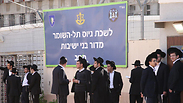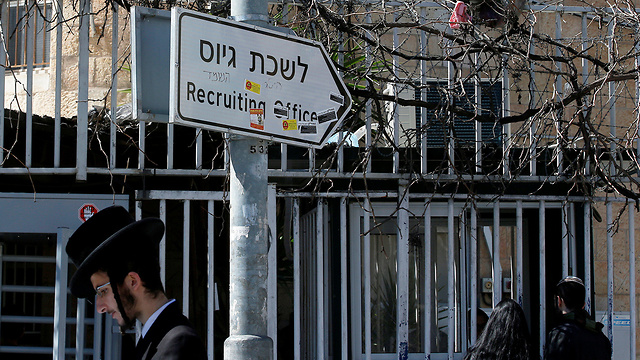

Committee recommends expanding sanctions on Haredi draft dodgers
Recommendations include establishing new enlistment tracks to promote ultra-Orthodox integration in job market and imposing financial rather than criminal sanctions on yeshivot that don't meet draft quota of 85 percent; Plesner Committee: Proposal perpetuates discrimination in Israeli society.
The committee also recommended expanding the sanctions imposed on defectors and draft dodgers.
In addition, the committee recommended imposing significant financial sanctions for failing to meet the enlistment goals and supported promoting benefits and rewards to all IDF soldiers.
One of the committee's comprehensive recommendations is to revoke the law amendment (of rewarding Haredi soldiers) if 85 percent of the enlistment goals are not met within three consecutive years.
Moreover, benefits and rewards will be given to all those who serve in the army in order to diminish the inequality in the Israeli society, and national service will also increase tracks suitable for Haredi needs while promoting their integration in the employment world.
The committee stated that "the number of IDF enlistment from the Haredi public has increased tenfold over the past decade. We must continue the efforts and gradually increase the number of those serving in the IDF and national service.
"This move corresponds with processes evolving in the Haredi sector and we suggest to formulate a multi-annual program that will allow (those process) to deepen and fully develop, and at the same time, continue drafting Haredim in growing numbers," the committee added.
The new recommendations revoke criminal sanctions, thereby enabling most of the Haredim to remain in their yeshivot. The new annual goals determined by the committee are similar to those existing so far and are not binding—such as the enlistment quota that has to be met.
The financial sanctions that will be imposed on the yeshivot for not meeting recruitment goals will be gradual and limited.
The increase in benefits and rewards for those who already serve in the army has already begun over the past few years, prior to the new outline suggested by the committee.
The Plesner Committee— which is also known as the committee for equality in the burden—said that Defense Minister Abigdor Lieberman "who used to be one of our greatest supporters, has also given in to politics and to his desire keep his seat.
"(The new recommendations) will not change anything and will allow the vile discrimination (between Haredim and secular) to continue," the committee decried.
"The secular (citizens) and those who pertain to the national religious faction will continue serving in the army, while the Haredim will do whatever they please, being paid high salaries and with no sanctions (really) imposed," the committee slammed.
"This is another law that will be rejected by the public as well as by the High Court of Justice (HCJ)," the committee concluded.
The committee is headed by the legal advisor to the defense establishment and its members have been meeting over the past few weeks with military and government elements, rabbis and other public officials.
It was meant to formulate an applicable and relevant bill that would be in line with the IDF's needs as stately, equal army of the people, as well as one that could be approved by the HCJ while revoking the 21 amendment to the law and gain the extensive consent required for legislation.
The committee's recommendations were unanimous and were approved by the defense minister and Chief of Staff Lt. Gen. Gadi Eisenkot.
The recommendations constitutes the foundation on which the memorandum of the bill is currently being released to the public, prior to its presentation to the government and the Knesset.
The bill is supposed to be voted into a law by the end of the Knesset's summer session.

















